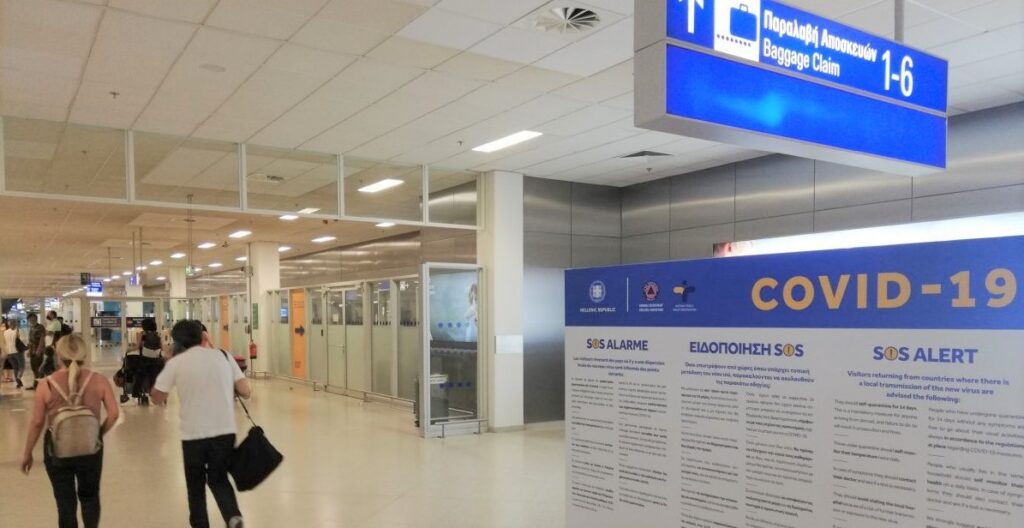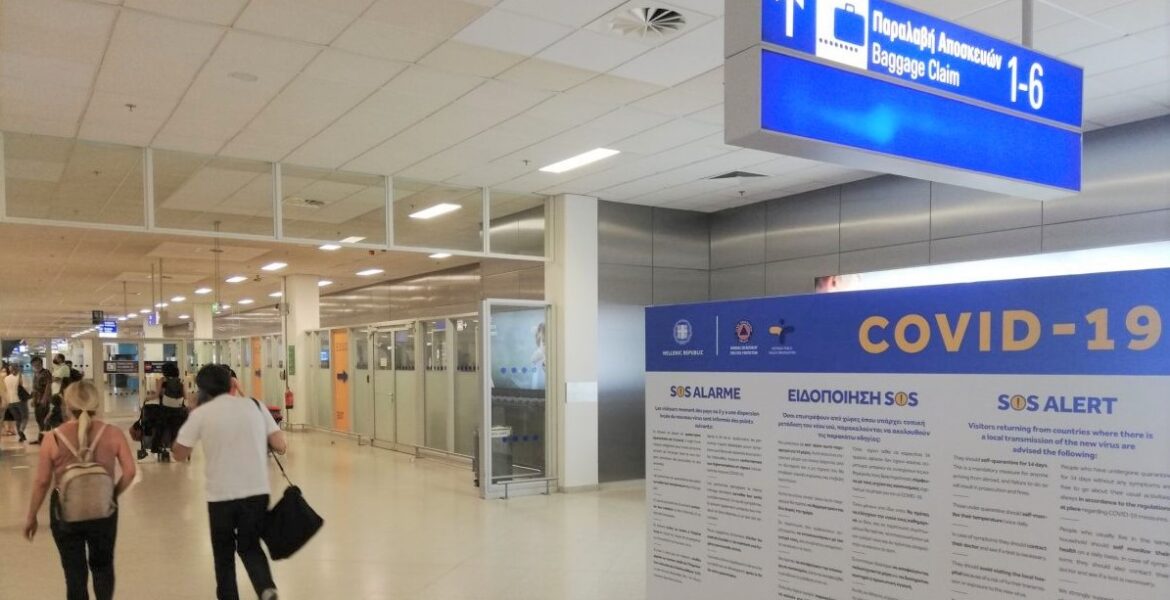
As of July 1, Greece opened to tourism following the relaxation of coronavirus-related restrictions.
The government determined how the country will welcome travellers, carry out the necessary diagnostic screening and keep everyone safe throughout the season.
All passengers arriving in Greece must fill in a Passenger Locator Form (PLF) at least a day before arrival, providing information that will include their departure airport, the address where they will be staying and the expected duration of their stay in Greece, among others. The information on the form is a key element of the country’s planning for protection against the pandemic and preventing the spread of the virus.
- Travellers will receive a confirmation email upon submission of the PLF.
- Travellers will receive the PLF with their unique Quick Response (QR) code on the day of their scheduled arrival in Greece (at midnight) and will be notified via email (the QR code will be provided in a link in the confirmation email).
- Travellers boarding or embarking on the previous day of the arrival will be allowed to do so upon showing the confirmation email, since they will receive their QR code during their flight or voyage.
Protocol for air arrivals
- Arrival at the entry gate.
- Transfer to the area where the screening personnel are located. Travellers are requested to show their QR code either on their mobile phone screen or in print. If travel departure begins prior to the day of arrival, travellers are allowed to board after showing the confirmation email (and not necessarily the QR code which is scheduled to arrive during their trip.)
- Depending on their QR code/confirmation, travellers are directed either to the screening area where they will be tested for the new coronavirus SARS-CoV-2 by a trained health team or to the exit (to baggage claim area or passport control).
- Upon completion of the test, travellers are directed towards the exit (to baggage claim area or passport control).
- The test results are expected to become available within 24 hours. During that time, passengers who are tested are advised to practise social distancing according to local guidelines and self monitoring for symptoms that could indicate COVID-19. In case of such symptoms, medical advice and/or contact with the National Public Health Organization (EODY) Operations Centre should be immediately sought. Only in case they test positive, the authorities will contact them and proceed with the health protocol in place. Otherwise, they may continue with their holidays, adhering to the general public health safety guidelines.
- If travellers plan to have multiple stop-overs in Greece, they must declare this and report their initial destination and their travel itinerary for the next 7 days.
- As of Tuesday July 28th, 2020, passengers of flights from Bulgaria and Romania to Greece will be required to have a negative molecular test result (PCR) for COVID-19, performed up to 72 hours before their entry to Greece*. This does not apply to Greek citizens, permanent residents of Greece and travellers for essential professional reasons.
- Travellers should be laboratory tested with RT-PCR of oropharyngeal or nasopharyngeal swab.
- Only travellers who carry a certificate of a negative RT-PCR test result will be allowed by the border authorities to enter the country. The certificates should be written in English and bear the name and passport/national ID number of the traveler.
- The Laboratories that perform the RT-PCR testing should be:
- National Reference laboratories
- National Public Health Laboratories or
- Private laboratories which are accredited from the respective national accreditation authorities (not necessarily specifically for COVID-19).
- Certificates that do not fulfil the above criteria will not be accepted. Certificate forgery is punished by Greek Law.
- Travellers will still have to complete and submit their PLF form and may be subject to random testing upon arrival to the Greek border.
*Specifically on Tuesday July 28th and Wednesday July 29th, travellers who did not have time to be tested before departure will be tested by Greek competent authorities upon arrival in Greece.
All travellers must comply with all of the necessary preventive hygiene measures (use of masks and physical distancing) according to local guidance.
Protocol for sea arrivals
- Arrival of incoming travellers on foot at the main entry gate.
- Incoming travellers arriving in vehicles are directed to the special entry gate.
- Transfer to the area where the screening personnel are located. Travellers are requested to show their QR code either on their mobile phone screen or in print. If travel departure begins prior to the day of arrival, travellers are allowed to board after showing the confirmation email (and not necessarily the QR code which is scheduled to arrive during their trip.)
- Depending on their QR code/confirmation, travellers are directed either to the screening area where they will be tested for the new coronavirus SARS-CoV-2 by a trained health team or to the exit (to baggage claim area or passport control).
- Upon completion of the test, travellers are directed towards the exit (to baggage claim area or passport control).
- The test results are expected to become available within 24 hours. During that time, passengers who are tested are advised to practise social distancing according to local guidelines and self monitoring for symptoms that could indicate COVID-19. In case of such symptoms, medical advice and/or contact with the National Public Health Organization (EODY) Operations Centre should be immediately sought. Only in case they test positive, the authorities will contact them and proceed with the health protocol in place. Otherwise, they may continue with their holidays, adhering to the general public health safety guidelines.
- If travellers plan to have multiple stop-overs in Greece, they must declare this and report their initial destination and their travel itinerary for the next 7 days.
All travellers must comply with all of the necessary preventive hygiene measures (use of masks and physical distancing) according to local guidance.
Protocol for arrivals at land borders
- Arrival of persons at the checkpoint.
- Passport and customs control are carried out.
- Transfer to the area where screening personnel is located. Travellers are requested to show their QR code either on their mobile phone screen or in print.
- Screening personnel direct travellers, depending on their QR code, either to the screening area where they will be tested for the new coronavirus SARS-CoV-2 by a trained health team or to the exit. Upon completion of the screening, tested travellers are also directed towards the exit.
- The screening results are expected to become available within 24 hours. During that time, passengers who are tested are advised to practise social distancing according to local guidelines and self monitoring for symptoms that could indicate COVID-19. In case of such symptoms, medical advice and/or contact with the National Public Health Organization (EODY) Operations Centre should be immediately sought. Only in case they test positive, the authorities will contact them and proceed with the health protocol in place. Otherwise, they may continue with their holidays, adhering to the general public health safety guidelines.
- If travellers plan to have multiple stop-overs in Greece, they must declare this and report their initial destination and their travel itinerary for the next 7 days.
- As of Wednesday July 15th, 2020 at 00:01 (GMT+3), all travellers entering Greece for non-essential reasons through Promachonas border station, are obliged to present upon arrival a negative molecular test result (PCR) for COVID-19, performed up to 72 hours before their entry to Greece.
- Travellers should be laboratory tested with RT-PCR of oropharyngeal or nasopharyngeal swab.
- Only travellers who carry a certificate of a negative RT-PCR test result will be allowed by the border authorities to enter the country. The certificates should be written in English and bear the name and passport/national ID number of the traveler.
- The Laboratories that perform the RT-PCR testing should be:
- National Reference laboratories
- National Public Health Laboratories or
- Private laboratories which are accredited from the respective national accreditation authorities (not necessarily specifically for COVID-19).
- Certificates that do not fulfil the above criteria will not be accepted. Certificate forgery is punished by Greek Law.
- Travellers will still have to complete and submit their PLF form and may be subject to random testing upon arrival to the Greek border.
All travellers must comply with all of the necessary preventive hygiene measures (use of masks and physical/social distancing) according to local guidance.
Travel Q&A:
Greece is ready once again to welcome the world. Here is how:
1st July onwards
Residents form EU+ countries are allowed to travel to Greece. EU+ consists of the European Union, the United Kingdom, Switzerland, Norway, Lichtenstein and Iceland.
Algeria, Australia, Canada, Georgia, Japan, Morocco, New Zealand, Rwanda, South Korea, Thailand, Tunisia, Uruguay, China*.
*subject to confirmation of reciprocity.
Other countries citizens are allowed to travel to Greece only for essential travel.
AIR
International flights are allowed into all airports in Greece.
Extension of ban for direct flights from the UK & Sweden until July 15th.
LAND
Land border arrivals from Bulgaria are allowed through Promachonas border station. Entry from other border stations with Bulgaria is allowed for essential travel.
With regards to Albania, North Macedonia and Turkey entry is allowed for essential travel.
SEA
Arrivals by sea by ferry ships are allowed only in Patras, Corfu and Igoumenitsa ports.
Travellers must complete 24 hours before their arrival in Greece a Passenger Locator Factor (PLF) form and a confirmation email will be received upon its submission. An electronic or hard copy of the PLF confirmation should be presented to the designated crew members before embarkation onboard a ship at any Italian port. Travelers will also receive the PLF with a QR code on the day of their scheduled arrival in Greece (at midnight) and will be notified via email (the QR code will be provided in a link in the confirmation email).
No such restriction applies on yachting.
All visitors from air, land or sea, will be subject to random tests upon arrival. Upon being tested, travellers move to their final destination. In the event of a positive result, they will be contacted and placed on 14-day quarantine, with expenses covered by the Greek state.
Greece at any stage retains the right to modify any of the above in light of changing circumstances. A team within the Infectious Diseases Committee evaluates the epidemiological data on a regular basis and recommends changes to restrictions.
*Information sourced from the Greek Government Website.


